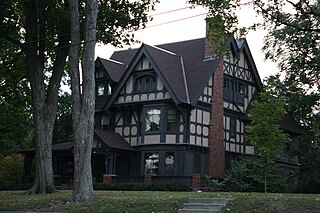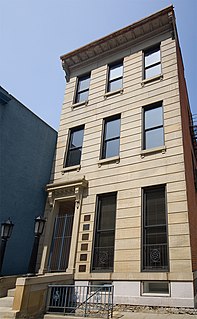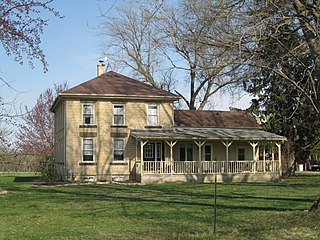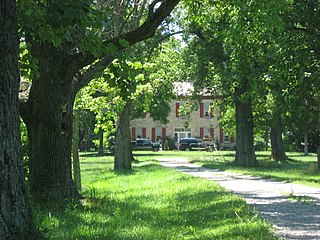 W
WThe Broom-Braden Stone House is a historic residence located near the city of Cambridge in Guernsey County, Ohio, United States. Home to a prominent early citizen of the area, it is one of Guernsey County's best early houses still in existence, and it has been named a historic site.
 W
WLuke Brown House is a historic home located at Parishville in St. Lawrence County, New York. It was built in 1823 and is a 2-story, five-by-three-bay, side-gabled Federal-style residence constructed of red Potsdam Sandstone. Attached is a 1 1⁄2-story side frame wing built about 1870.
 W
WThe F. A. Chadbourn House is located in Columbus, Wisconsin.
 W
WThe George B. Cox House is a historic residence in Cincinnati, Ohio, United States. An Italianate building constructed in 1894, this two-and-a-half story building was built as the home of leading Hamilton County politician George B. Cox.
 W
WThe Abraham J. Friedlander House is a historic residence in downtown Cincinnati, Ohio, United States. Erected in 1830, it features a facade three stories tall and three bays wide; although brick is employed in some of the walls, both the foundation and the walls are predominantly sandstone. At the time of its construction, the house was used as a multi-person home; its residents were multiple tradesmen in the house's early years. Among its uses since that time has been that of a law office.
 W
WThe John Herrington House and Herrington Bethel Church are a pair of historic buildings located near Mechanicstown in Carroll County, Ohio, United States. Constructed in the 1840s, they bear the name of a prominent local Methodist minister, and they have together been named a historic site.
 W
WThe Samuel Hunt House is located in Rutland, Wisconsin.
 W
WThe James Akey Farm is a historic farmstead near the village of Mount Eaton in southeastern Wayne County, Ohio, United States. Composed of a farmhouse and several significantly newer outbuildings, it was constructed as the home of Irish immigrant James Akey and his family, who moved to the area in the early 19th century and built the present farmhouse in 1822. The farmhouse is primarily a sandstone structure, although with some newer elements of concrete; its roof is made of metal. A plain structure without ornate architectural details, it is a large residence that architectural historians have seen as imposing and highly proportional.
 W
WThe Frederick Kindleberger Stone House and Barn is a historic farmstead in the rural southeastern region of the U.S. state of Ohio. Located near the village of Clarington in Monroe County, the complex is distinguished by its heavy masonry architecture, and it has been named a historic site.
 W
WThe Mary Worthington Macomb House is a historic residence in southern Chillicothe, Ohio, United States. Located on South Paint Street, the house sits on the banks of Paint Creek. One of the oldest buildings still in existence in Chillicothe, the Macomb House sits on a land tract of 35 acres (14 ha) that was originally owned by Nathaniel Massie. A later owner started to build the present house in 1813, and it was completed two years later. In the same year, former U.S. Senator and future Governor Thomas Worthington purchased the property.
 W
WThe S.C. Mayer House is a historic house in the Over-the-Rhine neighborhood of Cincinnati, Ohio, United States. Constructed in the late 1880s, it has been recognized because of its mix of major architectural styles and its monolithic stone walls. Built by a leading local architect, it has been named a historic site.
 W
WOak Hill is a historic former farmhouse in the southern part of the U.S. state of Ohio. Located along Dun Road in Ross County, it is one of the finest examples of sandstone farmhouses in the vicinity of the city of Chillicothe.
 W
WThe Renick House, also known as "Paint Hill", is a historic house in western Chillicothe, Ohio, United States. Built in 1804, it is a two-story stone structure in the shape of the letter "L". Among its most prominent features are gables and large chimneys on each end, a massive central chimney, and a central front entrance with a fanlight and a porch with decorative pediment. The house's sandstone facade is pierced by six openings: three windows on the second story and the door and two windows on the first.
 W
WThe Jonathan Sprague House is a historic residence in northwestern Washington County, Ohio, United States. Located atop a bluff above the Muskingum River, it is one of Washington County's most significant houses, due to its age and method of construction.
 W
WThe Stone House of John Marsh is a historic stone house in Contra Costa County, California, built in 1855–56. It is now included in the newly-designated Marsh Creek State Park. It has not been officially opened to the public because of safety concerns, but restoration began in 2006 and is continuing as of October 2017.
 W
WJonathan Wallace House is a historic home located at Potsdam in St. Lawrence County, New York. It was built in 1828 and is a two-story, five-bay, hipped-roof Federal style residence with a two-story rear wing built about 1846. The main block and wing are constructed of red Potsdam Sandstone in the slab and binder style.
 W
WWawbeek-Horace A.J. Upham House is located in Wisconsin Dells, Wisconsin.